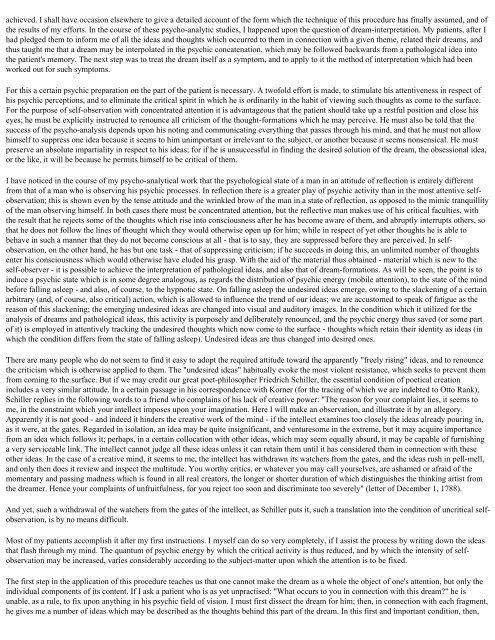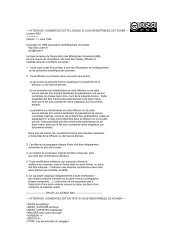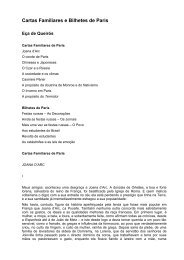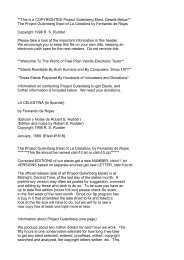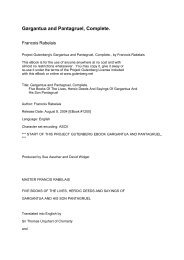The Interpretation of Dreams Sigmund Freud (1900)
The Interpretation of Dreams Sigmund Freud (1900)
The Interpretation of Dreams Sigmund Freud (1900)
Create successful ePaper yourself
Turn your PDF publications into a flip-book with our unique Google optimized e-Paper software.
achieved. I shall have occasion elsewhere to give a detailed account <strong>of</strong> the form which the technique <strong>of</strong> this procedure has finally assumed, and <strong>of</strong><br />
the results <strong>of</strong> my efforts. In the course <strong>of</strong> these psycho-analytic studies, I happened upon the question <strong>of</strong> dream-interpretation. My patients, after I<br />
had pledged them to inform me <strong>of</strong> all the ideas and thoughts which occurred to them in connection with a given theme, related their dreams, and<br />
thus taught me that a dream may be interpolated in the psychic concatenation, which may be followed backwards from a pathological idea into<br />
the patient's memory. <strong>The</strong> next step was to treat the dream itself as a symptom, and to apply to it the method <strong>of</strong> interpretation which had been<br />
worked out for such symptoms.<br />
For this a certain psychic preparation on the part <strong>of</strong> the patient is necessary. A tw<strong>of</strong>old effort is made, to stimulate his attentiveness in respect <strong>of</strong><br />
his psychic perceptions, and to eliminate the critical spirit in which he is ordinarily in the habit <strong>of</strong> viewing such thoughts as come to the surface.<br />
For the purpose <strong>of</strong> self-observation with concentrated attention it is advantageous that the patient should take up a restful position and close his<br />
eyes; he must be explicitly instructed to renounce all criticism <strong>of</strong> the thought-formations which he may perceive. He must also be told that the<br />
success <strong>of</strong> the psycho-analysis depends upon his noting and communicating everything that passes through his mind, and that he must not allow<br />
himself to suppress one idea because it seems to him unimportant or irrelevant to the subject, or another because it seems nonsensical. He must<br />
preserve an absolute impartiality in respect to his ideas; for if he is unsuccessful in finding the desired solution <strong>of</strong> the dream, the obsessional idea,<br />
or the like, it will be because he permits himself to be critical <strong>of</strong> them.<br />
I have noticed in the course <strong>of</strong> my psycho-analytical work that the psychological state <strong>of</strong> a man in an attitude <strong>of</strong> reflection is entirely different<br />
from that <strong>of</strong> a man who is observing his psychic processes. In reflection there is a greater play <strong>of</strong> psychic activity than in the most attentive selfobservation;<br />
this is shown even by the tense attitude and the wrinkled brow <strong>of</strong> the man in a state <strong>of</strong> reflection, as opposed to the mimic tranquillity<br />
<strong>of</strong> the man observing himself. In both cases there must be concentrated attention, but the reflective man makes use <strong>of</strong> his critical faculties, with<br />
the result that he rejects some <strong>of</strong> the thoughts which rise into consciousness after he has become aware <strong>of</strong> them, and abruptly interrupts others, so<br />
that he does not follow the lines <strong>of</strong> thought which they would otherwise open up for him; while in respect <strong>of</strong> yet other thoughts he is able to<br />
behave in such a manner that they do not become conscious at all - that is to say, they are suppressed before they are perceived. In selfobservation,<br />
on the other hand, he has but one task - that <strong>of</strong> suppressing criticism; if he succeeds in doing this, an unlimited number <strong>of</strong> thoughts<br />
enter his consciousness which would otherwise have eluded his grasp. With the aid <strong>of</strong> the material thus obtained - material which is new to the<br />
self-observer - it is possible to achieve the interpretation <strong>of</strong> pathological ideas, and also that <strong>of</strong> dream-formations. As will be seen, the point is to<br />
induce a psychic state which is in some degree analogous, as regards the distribution <strong>of</strong> psychic energy (mobile attention), to the state <strong>of</strong> the mind<br />
before falling asleep - and also, <strong>of</strong> course, to the hypnotic state. On falling asleep the undesired ideas emerge, owing to the slackening <strong>of</strong> a certain<br />
arbitrary (and, <strong>of</strong> course, also critical) action, which is allowed to influence the trend <strong>of</strong> our ideas; we are accustomed to speak <strong>of</strong> fatigue as the<br />
reason <strong>of</strong> this slackening; the emerging undesired ideas are changed into visual and auditory images. In the condition which it utilized for the<br />
analysis <strong>of</strong> dreams and pathological ideas, this activity is purposely and deliberately renounced, and the psychic energy thus saved (or some part<br />
<strong>of</strong> it) is employed in attentively tracking the undesired thoughts which now come to the surface - thoughts which retain their identity as ideas (in<br />
which the condition differs from the state <strong>of</strong> falling asleep). Undesired ideas are thus changed into desired ones.<br />
<strong>The</strong>re are many people who do not seem to find it easy to adopt the required attitude toward the apparently "freely rising" ideas, and to renounce<br />
the criticism which is otherwise applied to them. <strong>The</strong> "undesired ideas" habitually evoke the most violent resistance, which seeks to prevent them<br />
from coming to the surface. But if we may credit our great poet-philosopher Friedrich Schiller, the essential condition <strong>of</strong> poetical creation<br />
includes a very similar attitude. In a certain passage in his correspondence with Korner (for the tracing <strong>of</strong> which we are indebted to Otto Rank),<br />
Schiller replies in the following words to a friend who complains <strong>of</strong> his lack <strong>of</strong> creative power: "<strong>The</strong> reason for your complaint lies, it seems to<br />
me, in the constraint which your intellect imposes upon your imagination. Here I will make an observation, and illustrate it by an allegory.<br />
Apparently it is not good - and indeed it hinders the creative work <strong>of</strong> the mind - if the intellect examines too closely the ideas already pouring in,<br />
as it were, at the gates. Regarded in isolation, an idea may be quite insignificant, and venturesome in the extreme, but it may acquire importance<br />
from an idea which follows it; perhaps, in a certain collocation with other ideas, which may seem equally absurd, it may be capable <strong>of</strong> furnishing<br />
a very serviceable link. <strong>The</strong> intellect cannot judge all these ideas unless it can retain them until it has considered them in connection with these<br />
other ideas. In the case <strong>of</strong> a creative mind, it seems to me, the intellect has withdrawn its watchers from the gates, and the ideas rush in pell-mell,<br />
and only then does it review and inspect the multitude. You worthy critics, or whatever you may call yourselves, are ashamed or afraid <strong>of</strong> the<br />
momentary and passing madness which is found in all real creators, the longer or shorter duration <strong>of</strong> which distinguishes the thinking artist from<br />
the dreamer. Hence your complaints <strong>of</strong> unfruitfulness, for you reject too soon and discriminate too severely" (letter <strong>of</strong> December 1, 1788).<br />
And yet, such a withdrawal <strong>of</strong> the watchers from the gates <strong>of</strong> the intellect, as Schiller puts it, such a translation into the condition <strong>of</strong> uncritical selfobservation,<br />
is by no means difficult.<br />
Most <strong>of</strong> my patients accomplish it after my first instructions. I myself can do so very completely, if I assist the process by writing down the ideas<br />
that flash through my mind. <strong>The</strong> quantum <strong>of</strong> psychic energy by which the critical activity is thus reduced, and by which the intensity <strong>of</strong> selfobservation<br />
may be increased, varies considerably according to the subject-matter upon which the attention is to be fixed.<br />
<strong>The</strong> first step in the application <strong>of</strong> this procedure teaches us that one cannot make the dream as a whole the object <strong>of</strong> one's attention, but only the<br />
individual components <strong>of</strong> its content. If I ask a patient who is as yet unpractised: "What occurs to you in connection with this dream?" he is<br />
unable, as a rule, to fix upon anything in his psychic field <strong>of</strong> vision. I must first dissect the dream for him; then, in connection with each fragment,<br />
he gives me a number <strong>of</strong> ideas which may be described as the thoughts behind this part <strong>of</strong> the dream. In this first and important condition, then,


